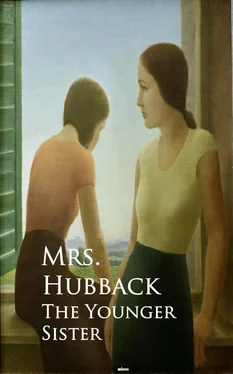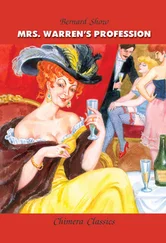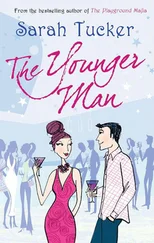Mr. Howard noticed that it was Emma who rolled his easy chair into the proper position, Emma, who arranged his footstool, who drew the curtain to exclude the glare of the wintry sun, placed the screen to ward off the draught from the door, and laid his spectacles, snuff-box, and writing-case on precisely the proper spots of the proper table next him. Elizabeth was conversing with her visitor, and Margaret never stirred on such occasions. Certainly Emma's exertions, at this time, were almost rendered useless by the zeal with which Mr. Howard seconded her movements. Mr. Watson's comforts were soon arranged in the most satisfactory manner, such as long habit had rendered indispensable to him, and when he had carefully adjusted his spectacles, and taken a survey of the room, he turned to Mr. Howard, and enquired, who was that nice young woman talking to Elizabeth.
On being answered that it was his sister, he civilly apologised for not having known her, which, as he had never seen her before, he remarked, was not wonderful; but Elizabeth ought to have introduced him before he sat down, as really the gout made it extremely difficult to move across the room. Elizabeth did not think it necessary to justify herself by informing him, that it was only owing to the self-engrossment and bustle attending his progress and settlement in his arm-chair, that her attempt at an introduction had been thwarted; indeed, Miss Watson was so little used to such ceremonies as to have seized precisely the most inauspicious moment for speaking, and having been foiled in her first essay, sat down without trying again.
Mrs. Willis, however, made it all easy, and soothed Mr. Watson's discomposure at such a breach of etiquette, by the good-natured and respectful manner in which she now addressed him.
Whilst they were sitting in pleasant chat, Tom Musgrove again appeared amongst them. Emma really began to hate the sight of him on Margaret's account, as her sister's manners whilst in his company, cost her many blushes; and her increase of fretfulness after his departure occasioned discomfort to the whole party. It was a great gratification to her to discover from Mr. Watson's manner, that he was very far from looking on Tom Musgrove as the amiable and elegant gentleman that he aspired to be considered, and she even fancied that her father did not receive him simply as an inoffensive guest; on the contrary, he seemed annoyed at his visit, and inclined to regard it as an intrusion.
"Well master Tom," said he, "what foolish thing have you been doing lately?—breaking any more horses' knees or dinner-engagements—your genius cannot have been idle since I saw you last—let's hear all about it."
"No indeed sir," replied Tom; "I have been doing nothing worth chronicling, at least to such a
judge
as you. I have had my own little amusements, but they are not worth detailing. By the bye Howard, I dare say Osborne did not tell you how completely I beat him at Fives the other day: he's a good player too—but didn't I astonish him."
"Lord Osborne seldom entertains me with accounts of his sports, whether defeated or victorious," replied Mr. Howard, coolly.
"When you have the gout in your foot even twice as bad as I have," observed Mr. Watson, "it will be consolatory to you to remember that you could once beat Lord Osborne at Fives."
"Aye sir, I dare say I shall have my turn by-and-bye, I expect to have it early—Osborne tells me
his
father had it at five-and-twenty. It's an aristocratic complaint."
"Unless you have reason to suppose the late Lord Osborne was
your
father likewise," resumed Mr. Watson drily, "I don't see what either his gout or his aristocracy have to do with you."
"Do you feel any symptoms already?" whispered Margaret; "you really ought to take care of yourself—who would be so much missed if you were laid up with that dreadful disorder! and who would you get to nurse you in your hours of suffering?"
"Oh I'll take care of myself, Miss Margaret," said he pointedly; "gout makes one a prisoner, which is bad—I hate all confinement, and bonds of every kind, especially fire-side bonds: freedom for me—freedom at home and abroad—perfect freedom. By the bye, Howard," continued he, breaking in upon a very agreeable conversation which that gentleman was carrying on aside with Emma, "I knew you were here when I came in, by that curious vehicle standing at the door. Positively it must have belonged to your great grandfather—nobody more modern could have built such a conveyance!"
"One thing is certain," said Mr. Watson, "Mr. Howard
had
a great grandfather to whom it might have belonged—it is more than every one can say!"
Tom rather winced at this observation, for as it was known, to those who possessed good memories, that his grandfather had ridden about the country on a donkey, whilst carrying on the lucrative business of a rag-merchant, it was no very great stretch of the imagination to conclude that his more remote ancestor had been equally humble in his means of travelling.
"Perhaps it is not the most elegant conveyance in the world," replied its owner good-humouredly; "but it carries us very safely, and the most fashionable curricle would do no more."
"Upon my word I must beg to have the refusal of it, if you can be tempted to part with it, Howard, and I will send it to a museum somewhere, labelled the car of Cybele; I protest it puts me in mind of an old print of that machine, which belonged to an aunt of mine."
"Lord Osborne has promised to give me a new carriage when either he or I marry," said Mr. Howard; "and I mean to make mine serve till that event."
"And are you come wooing now in person or as proxy?" whispered Tom, quite loud enough for Emma to hear. "A good place this—one need not ask twice, I fancy."
"Mr. Musgrove," said Howard in his particularly quiet but decisive way, "you are as welcome to laugh at my carriage as you should be to use it, if it were necessary; but remember there are subjects on which jesting is indelicate, and places where it is insulting." He turned away as he spoke and addressed Mr. Watson, to give Emma's cheeks time to recover from the glow which betrayed that she had heard more than was pleasant.
Tom looked a little foolish, and after a moment's hesitation, addressed an enquiry to Emma as to whether she had been walking that forenoon. He only gained a mono-syllable in reply, and then Emma drawing little Charles towards her, began a confidential conversation with him on the subject of his garden and companions at school, and the comparative merits of base-ball and cricket. Tom was repulsed, so turning to Elizabeth, he cried:
"Well I must be going, Miss Watson, for I have an engagement. I promised to meet Fred Simpson and Beauclerc and another fellow presently—so I must be off. They want my opinion about some greyhounds Beauclerc has taken a fancy to but wouldn't buy till I had had time to see them. They are monstrous good fellows, and must not be kept waiting. Great friends of Osborne's, I assure you."
Nobody opposed his design: then turning with a softer tone and manner to Emma, he said,
"Really I must go to school again and take lessons from my little friend, to learn from him the art of finding agreeable conversation. What is the secret, Charles?"
"It is more easily explained than taught," replied Emma, "unaffected good-humour, sincerity, and simplicity. That is all!"
Tom took himself off, and as the sound of his curricle wheels died away in the distance, Mr. Watson observed:
"There goes a young man, who if he had had to work for his bread might have been a useful member of society. But unfortunately the father made a fortune, so the son can only make a fool of himself."
CHAPTER VIII.
"I suppose some of you girls will be for going over to return Mrs. Willis's visit," said Mr. Watson to his daughters, the next day; "she's a nice little woman so far as I saw, and I have no objection to your visiting her; but you must go to-morrow, if you go at all this week, for I cannot spare the horse after that day."
Читать дальше












